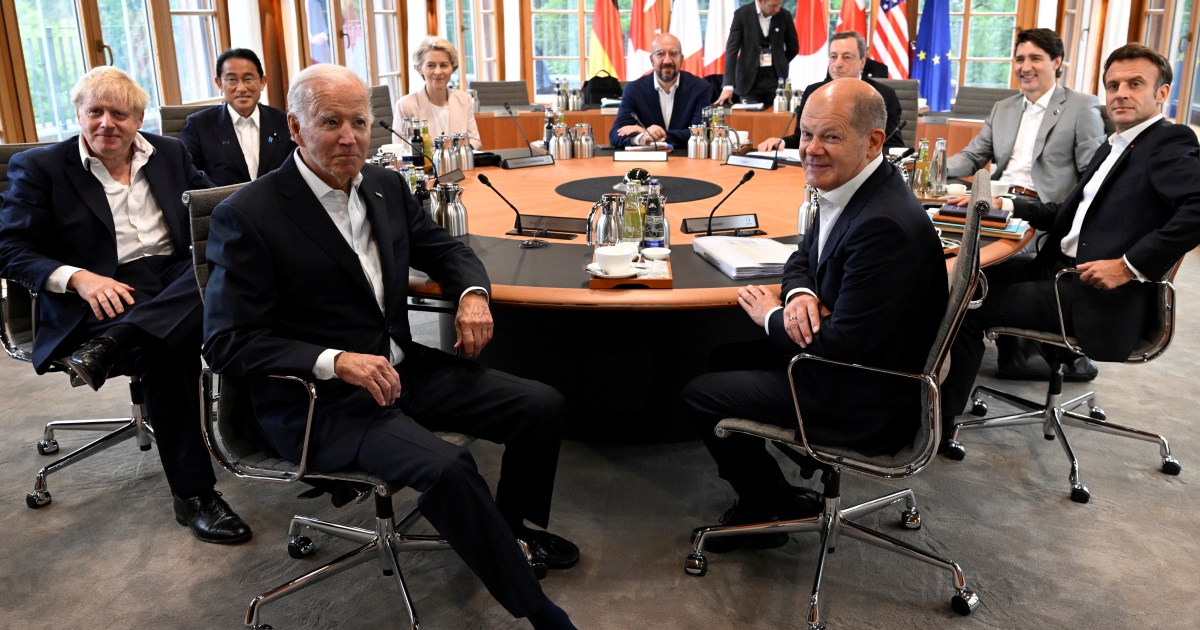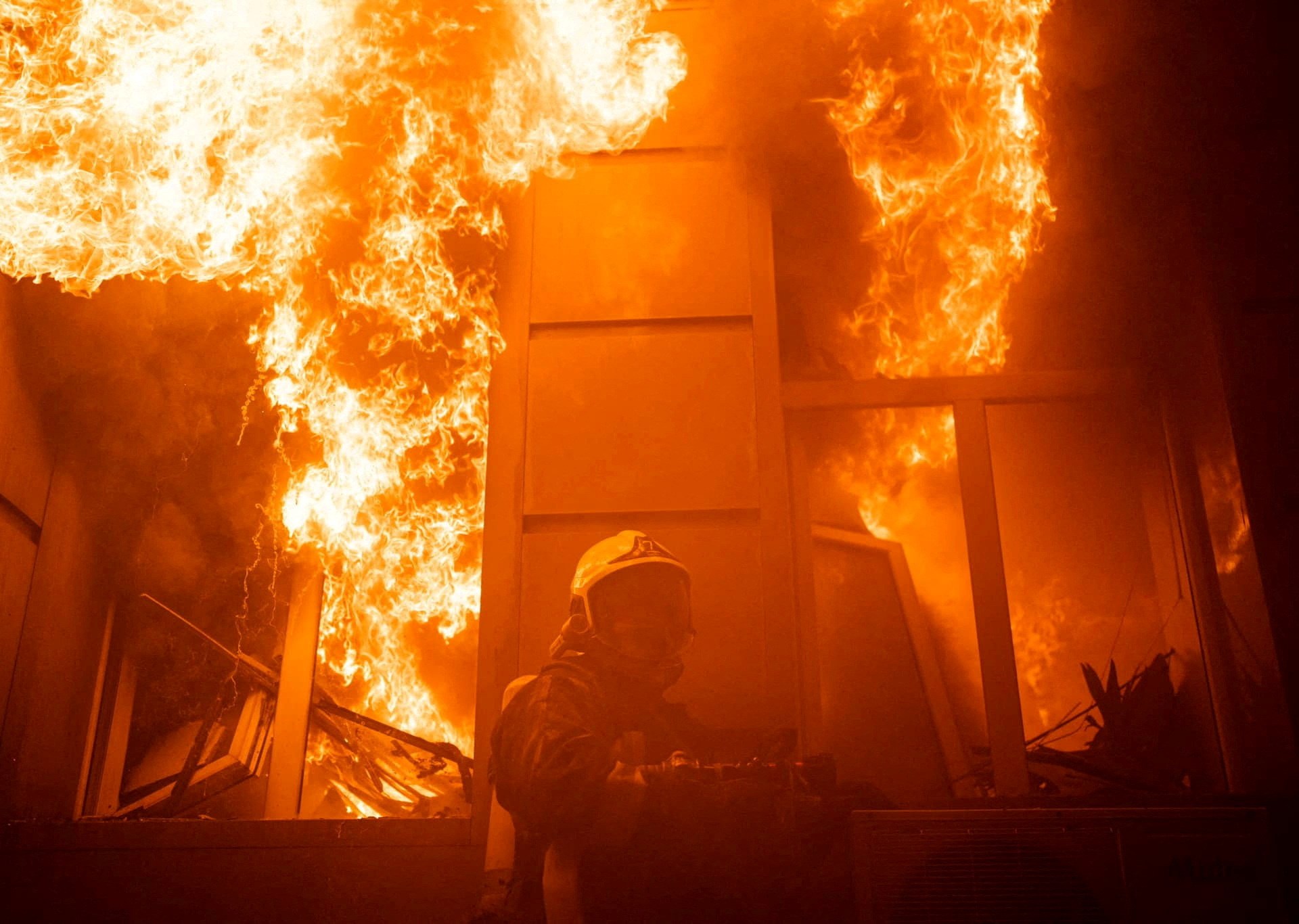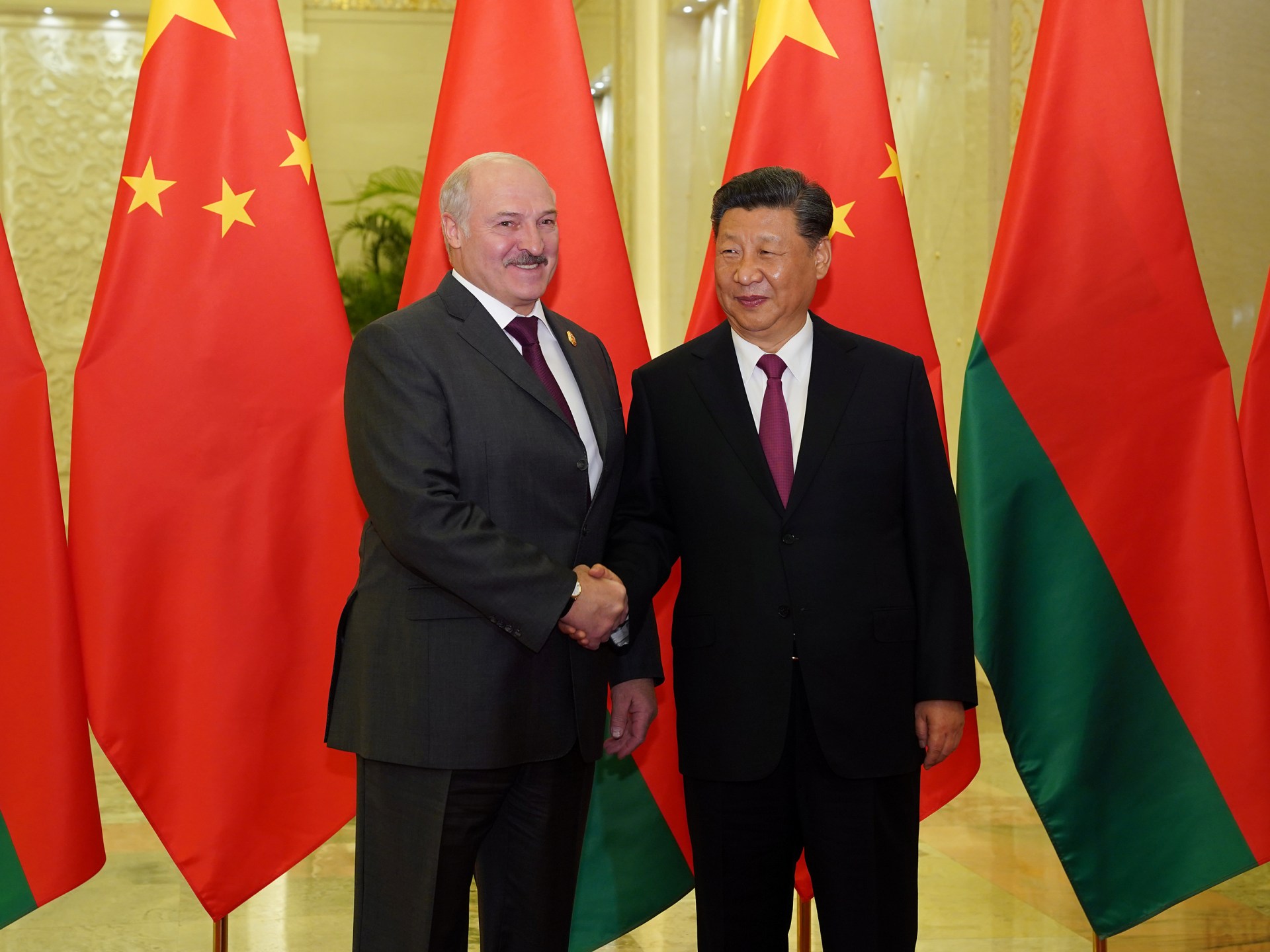Sanctions on Russia, protecting energy, food: The G7 action plans | Politics News
The annual summit was dominated by talks on how the G7 can support Ukraine in repelling Russia’s invasion while minimising the international fallout.
Leaders of the Group of Seven (G7) rich democracies have wrapped up a three-day summit at a luxury resort in the Bavarian Alps in southern Germany.
The annual summit was dominated by talks on how the world’s top industrialised nations can bolster Ukraine in repelling Russia’s invasion while minimising the international fallout on food prices and energy.
Here are some of the highlights on what the G7 agreed on Tuesday, the final day of the summit:
Russia sanctions
- The G7 said it will explore measures “to prevent Russia from profiting from its war of aggression”, including imposing a ban on the transport of Russian oil that has been sold above a certain price cap.
- The group is considering “a possible comprehensive prohibition of all services, which enable transportation for Russian seaborne crude oil and petroleum products globally”, unless the Russian oil has been “purchased at or below a price to be agreed” by the G7 consultation with international partners.
- “We will further reduce reliance on civil nuclear and related goods from Russia, including working to assist countries seeking to diversify their supplies,” the group said.
Energy
- Coordinating with the International Energy Agency, the G7 said they will explore measures to reduce price surges and prevent effects to economies and societies globally.
- They called for producer countries to “increase their production to decrease the tension in energy markets”.
- The G7 also committed “to end new direct public support” for the international fossil fuel energy sector by the end of 2022, “except in limited circumstances clearly defined by each country consistent with a 1.5 degree Celsius warming limit and the goals of the Paris Agreement”.
- “We commit to achieving a fully or predominantly decarbonised power sector by 2035,” the communique said.
- But the G7 also said that given the “exceptional circumstances” of the Ukraine war, “publicly supported investment in the gas sector can be appropriate as a temporary response.”
- An alliance of civil society organisations including Oil Change International issued a scathing verdict, condemning the “loopholes” on gas that made it into the final communique.
- Observers say Germany and Italy, heavily reliant on Russian energy, and other European countries, are racing to stockpile gas before winter and diversify suppliers as they brace for Russia to turn off the energy taps altogether after it recently slowed deliveries.
Food security
- The G7 committed to an additional $4.5bn “to protect the most vulnerable from hunger and malnutrition, amounting to a total of over $14bn as our joint commitment to global food security this year”.
- “We also commit to scaling up essential nutrition services in countries with the highest burden of malnutrition,” the G7 said in a statement.
- The members also said they stand by a commitment to keep their food and agricultural markets open and called on “all partners to avoid unjustified restrictive trade measures that increase market volatility and thus the risk of food insecurity“.
G7 ‘Climate Club’
- The G7 said it aims to establish a Climate Club for countries that are committed to implementing the Paris Agreement. The club will focus on the industry sector and climate, “thereby addressing risks of carbon leakage for emission intensive goods, while complying with international rules”.
- In a final communique from their meeting, the G7 said they noted “with concern that currently neither global ambition nor implementation is sufficient to achieve the goals of the Paris Agreement”.
- Renewing their “strong commitment” to the Paris Agreement on climate, the G7 said it will “intensify our efforts to delivering on the collective $100bn climate finance mobilisation goal as soon as possible and through to 2025”.
China – Russia, Ukraine, Hong Kong, Xinjiang, Tibet
- The G7 said they are “seriously concerned” about the situation unfolding in the East and South China seas: “We stress that there is no legal basis for China’s expansive maritime claims in the South China Sea”.
- The group also called on China to press Russia to “immediately and unconditionally withdraw its troops from Ukraine”.
- The G7 also called on China to honour its commitments made when Hong Kong was returned to Chinese control from British rule in 1997 under the “Sino-British Joint Declaration and the Basic Law, which enshrine rights, freedoms and a high degree of autonomy for Hong Kong”.
- The G7 said: “We are gravely concerned about the human rights situation in China. We will continue to promote universal values, including by calling on China to respect universal human rights and fundamental freedoms, including in Tibet and in Xinjiang where forced labour is of major concern to us.”
Iran
- The G7 reiterated “our clear commitment that Iran must never develop a nuclear weapon,” the communique said.
- “A diplomatic solution remains the best way to restrict Iran’s nuclear programme,” the group said.
Debt
- The G7 said it recognises the urgent need to improve frameworks for debt restructuring for the poorest countries “given the deteriorating and highly challenging debt situations of many developing countries and emerging markets”.
- As more than half of low-income countries are in debt distress or at high risk of debt distress, the group urged the main creditors, including China, “with large outstanding claims on low-income countries facing debt sustainability challenges…to contribute constructively to the necessary debt treatments as requested”.
COVID-19
- To overcome COVID-19, the G7 reaffirmed its “commitment to enabling equitable global access to and delivery of safe, effective, quality-assured and affordable vaccines, therapeutics, diagnostics, and other essential medical goods”.
Gender equality
- The G7 said it will “introduce a mechanism to continuously monitor G7 commitments and progress towards achieving gender equality”.
- The group will also support efforts to expand access to quality childcare infrastructure globally, including $79m support for a Childcare Incentive Fund aimed at improving “women’s economic empowerment, child outcomes, family welfare, and overall economic growth”.





Pingback: right here